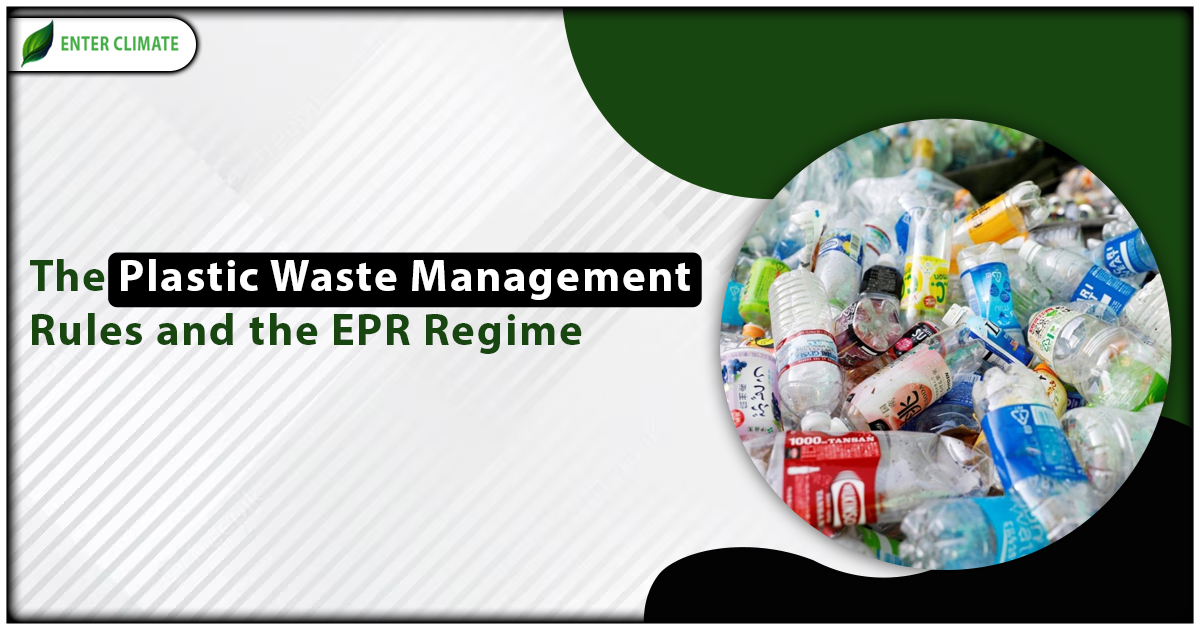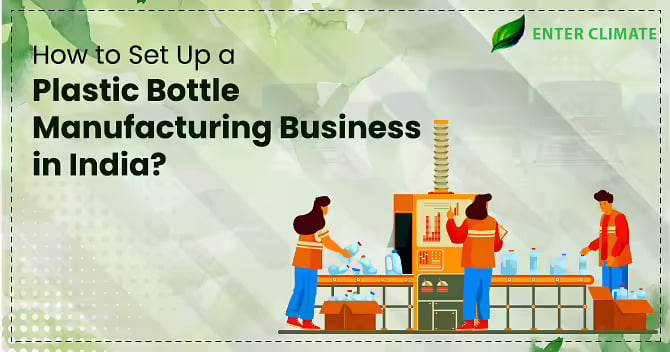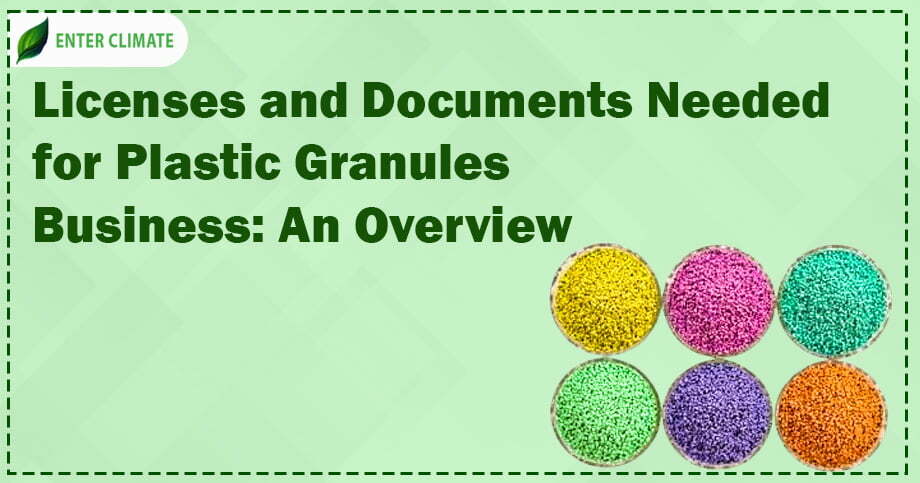Navigating through the Plastic Waste Management Rules and the EPR Regime
 25 Aug, 2023
25 Aug, 2023 
Are you a small enterprise or planning to kick-start a small business? Are you concerned about complying with the legal guidelines? You may have encountered various compliance requirements pertaining to, but not limited to, labour, tax compliances, GST registrations, License requirements, etc. Amidst all these compliances, one may forget about complying with the ever so important Environmental regulations. There was a time when this was an unchartered terrain, and one did not need to worry about or oblige with so many arduous and mandatory legal requirements, particularly relating to the environment, before starting a business, but that is not the case anymore.
But now, there are a plethora of pollution-related concerns that need to be addressed before undertaking any commercial activity. And if you are engaged in an industry that requires plastic packaging, then you ought to familiarize yourself with the EPR guidelines for Plastic Waste Management. In this article, we will understand the evolution of these guidelines, the recent amendments, and the logic behind these.
Background
Considering the exponential increase in the use of plastic over the years, it is obligatory to warrant that the profit-making enterprises are held significantly responsible for the carbon footprint they leave and the waste they generate and thereby ultimately guaranteeing that it is their skin in the game as well, after all running a business is like a double-edged sword, you have to accept the good, along with the bad, i.e. to say you have to accept the consequences of your actions. If your actions can have long-lasting impacts on society and the environment, then you are even more answerable and accountable.
The Plastic Waste Management Rules, 2016
Witnessing that the use of plastic in packaging has increased exponentially over the years, the Ministry of Environment and Climate Change provided a regulatory framework for the management of plastic waste generated by plastic consumers in the country in the year 2016. Many reports have highlighted that the environment faces significant perils due to the plastic waste generated, especially microplastics littered in oceans and landfills, causing pollution. The consumption of these plastic particles poses a grave risk to the health of individuals and the environment, given the hazardous levels of compounds like PCBs (polychlorinated biphenyls). These rules were formulated and passed to cover Manufacturers, Importers, Producers and Brand Owners (PIBOs), Plastic waste producers (PWP), Waste generators, Local Bodies and Gram Panchayat to check the plastic waste generated.
Amongst many other things, these rules aimed to enforce the responsibilities of producers and users of plastic packaging within the plastic waste management system in alignment with the concept of Extended Producer Responsibility. This was the first time such responsibility had been placed on the producers and the brand owners.
The Rules of 2016 introduced a plastic waste management fee by requiring the PIBOs to register, and this fee is intended to establish an effective waste management infrastructure.
Furthermore, the rules extended the scope of application from urban to rural areas, thereby acknowledging that plastic waste is generated in urban and rural settings.
However, these rules failed to deal with the informal sector, and there seems to be no mention of the methods to minimize plastic waste. Still, they mention enhancing the quality of plastic carry bags by elevating the minimum thickness from 40 to 50 microns.
The Plastic Waste Management Rules, 2018
To give an impetus to this objective of reducing and managing plastic waste and to make these rules more effective, these rules were revisited by the Government of India. They were thus further amended and modified in 2018. These amended rules prescribed a mandatory Central Registration system[1] for the Producers, Importers, and Brand Owners. It rendered an array of benefits as it financially incentivized the businesses to produce and use environmentally friendly products or otherwise invest and engage in segregation and safer waste disposal practices and techniques.
However, certain challenges cropped up with these amendments, as certain provisions were diluted. For instance, the Amended Rules of 2018 omitted the categorical pricing of carry bags mentioned in the 2016 Rule. Furthermore, the 2018 Rules provided for the phasing out of the MLP (Multi-layered plastics) that are “non-recyclable or non-energy recoverable or have no alternate use”, which hardly leaves out anything as any product can be brought under the ambiguous terms used here.
Many critics of these amended Rules have contended that they found the 2018 Rules to favour the profit-making business more than leaning towards environmental protection, thereby diluting the Extended Producer Responsibility.
Plastic Waste Management (Amendment) Rules of 2021
In pursuance of the same, the Ministry again came up with certain modifications to get a better grip on the situation and notified the Plastic Waste Management (Amendment) Rules of 2021. These amendments extended the scope and applicability of the previous rules. For instance, these amendments sought to include the enterprises dealing with “non-Woven plastic” under the ambit of these amended Rules, which the previous PMW Rules
did not govern.
Aligned to eliminate single-use plastic by 2022, some of the other meaningful reforms were introducing and including the guidelines related to the ‘single-use plastic commodity’, popularly known as disposable plastic (which is thrown after one use) in common parlance. This brought a revolutionary change in the pursuance of these guidelines as several state governments issued guidelines regarding imposing either partial or complete bans on single-use plastic products.
Furthermore, to address the concern of littering of microplastics in marine environments, the thickness of plastic carry bags was elevated from 50 microns to 75 microns. Notably, this thickness was to be increased to 120 microns by 31st December 2022 to promote the reuse of plastic carry bags. And the plastic packaging waste that falls outside the ambit of ‘single-use plastic’ will have to be handled by PIBOs under the Extended Producer Responsibility by the implemented rules.
The Plastic Waste Management Rules, 2022
To FastTrack these processes and streamline the registration of PIBOs (Producers, Importers, and Brand Owners), the Ministry of Environment (MoEFCC) introduced another amendment in 2022. The Plastic Waste Management (Amendment) Rules, 2022, notified on 16th February 2022, thereby imposed the enhanced Extended Producer’s Responsibility (EPR) to manage and control the menace of plastic waste as per the categories illustrated under the rules. These guidelines have been mentioned and annexed in Schedule II of the 2016 Rules to cast responsibilities on Producers, Importers, Brand Owners, Plastic Waste Processors, and the concerned Pollution Control Boards to ensure effective plastic waste management. This is in furtherance of the elimination of single-use plastics and to promote alternatives.
Furthermore, specific targets have been set for PIBOs based on the different categories mentioned in the guidelines, and environmental compensation will be imposed if they fail to bear their responsibilities and meet their obligations. This is entirely in line with the Polluter Pays Principle, which promotes the idea of making the miscreant pay for the damage caused to the environment due to his misdeeds.
The idea is not to make these PIBOs pay for using plastic. Instead, it encourages them to take accountability for the plastic waste generated, which is often discarded into the environment without proper treatment, thereby causing severe pollution. In line with this intention, Excess EPR Certificates may be developed to set off or carry forward the EPR Targets. If unable to meet these targets on their own, PIBOs may procure surplus EPR Certificates from other PIBOs. Still, the condition is that they both must be operating within the same category.
Conclusion
Plastic has become an indispensable part of our lives without any economical and biodegradable alternative available. It is so easily accessible and cheaper that we have been using plastic in our daily lives, mainly in the form of disposables and chucking it aside without considering the environmental repercussions. To prevent this littering of plastic into the environment, the government has taken this initiative to target the producers, manufacturers, importers, and even brand owners to either take accountability for their mishandling of this non-degradable material or use environment-friendly alternatives. The introduction and implementation of these Plastic Waste Management Rules signify a positive stride forward, aiming to incentivize these PIBOs to take responsibility for adopting appropriate plastic waste disposal techniques. This idea finds its basis in the Polluter Pays Principle, and by introducing amendments over time and bringing in concepts like EPR Certificates and Environmental compensation, these enterprises and businesses are likely to be driven towards fulfilling their EPR Targets. There may be some potential overlaps between these PIBOs, and businesses may feel burdened with these complex regulations, potentially affecting their sustainability in the market. Still, the overall impact of these steps is bound to be positive. We just have to wait and see how effectively and efficiently these will be implemented.
FAQs
The Government of India, under the Ministry of Environment and Climate Change, notified the Plastic Waste Management Rules.
EPR is the responsibility of a producer, importer and brand owner dealing with plastic packaging for the environment-friendly management of the product till the end of its life.
The following entities must register on the centralized CPCB portal
1. Producer
2. Importer
3. Brand owner
4. Plastic Waste Processor engaged in
(a) recycling
(b) waste to energy
(c) waste to oil
(d) industrial composting
PIBOs operational in more than two states/UTs must register with CPCB.
PIBOs operational in one or two states/UTs must register with the concerned SPCB/PCC.
Read our Article:Complete Overview Of EPR Policy In India













